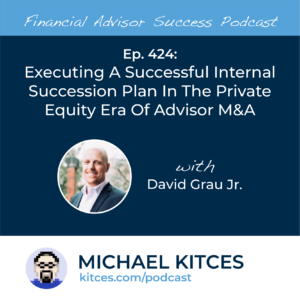Welcome everyone! Welcome to the 424th episode of the Financial Advisor Success Podcast!
My guest on today’s podcast is David Grau, Jr. David is the President of Succession Resource Group, an advisory consulting and valuation business based in Portland, Oregon that serves independent financial advisors with RIAs and broker-dealers.
What’s unique about David, though, is how his two decades of experience supporting financial advisory firms has helped him uncover best practices for founders and successors looking to execute internal succession plans, even as those succession plans have become more challenging at a time when founders so regularly field a steady flow of inbound inquiries from Private Equity-backed acquirers (often headlining high valuation multiples).
In this episode, we talk in-depth about the best practices David recommends to firms to start preparing in advance for an internal succession (including creating defined career tracks and compensation structures as well as getting the firm’s business metrics in order and receiving a third-party valuation), how David advocates for breaking up an internal succession plan into gradual tranches (for example, starting out by initially selling an internal successor a 1-5% ownership stake and ramping this percentage up with each subsequent tranche purchase over time) in order to make the financial commitment of doing so more palatable and financially feasible to successors, and why David recommends that firm founders start early when it comes to internal succession planning to get the ball rolling on these key actions and milestones, as if it takes at least 5 years to develop a potential successor and 10 more years to execute the transaction in a series of tranches, an advisor who plans to retire in their early 60s should ideally already be laying the succession groundwork by their late 40s!
We also talk about why David thinks that internal successions do remain viable at a time when Private Equity-backed aggregator firms are willing to buy smaller firms quickly and at a loftier headline valuation (in part because those high multiples often come with less attractive terms buried in the fine print of these deals), how David further finds that the publicly announced valuation of a PE acquisition is often misleading because the media only talks about the multiple of revenue or earnings and not the ‘adjustments’ that the buyer made to the firm’s projected earnings before striking the deal, and why David suggests that some firms who sell to PE-backed buyers might found it hard to meet the annual growth targets (often at least 15-20% and sometimes much higher) needed to receive the full compensation as outlined in the deal terms.
And be certain to listen to the end, where David shares why advisors might consider doing a partial sale of their no-longer-as-profitable clients to give them lifestyle flexibility while monetizing at least part of their business (and then continue to serve the smaller group of remaining high-value clients with better profitability and fewer working hours), how David suggests that preparing a firm for an internal succession (for instance by investing in staff to build a tenured advisor cadre) can end up benefiting a founder even if they do decide to do an external sale (in the form of a premium valuation for having a well-established team to handle the clients when the buyer comes in), and why David believes that while internal successions can involve more work than an external sale, they can often end up being more satisfying for the founder by allowing them to leave a well-defined legacy through their firm.
So, whether you’re interested in learning about best practices for preparing for an internal succession, the importance for selling firms of considering both a firm’s valuation and the deal terms when comparing offers, or the value of preparing for succession early (whether or not an internal succession is planned), then we hope you enjoy this episode of the Financial Advisor Success podcast, with David Grau Jr.
Read More…
